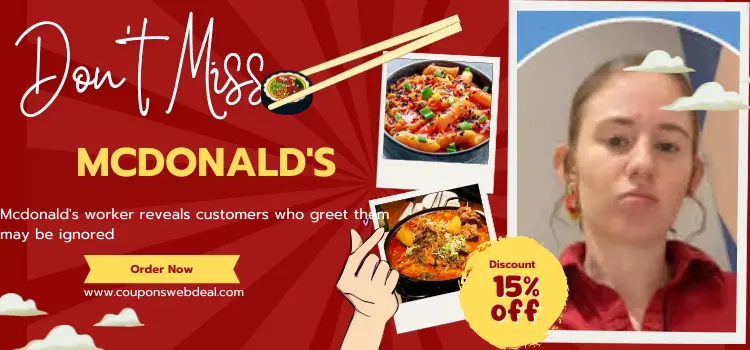Mcdonald’s worker reveals customers who greet them may be ignored

In the fast-paced world of fast food, customer service is often seen as a top priority. However, a recent revelation from a McDonald’s worker has sparked controversy—some employees admit that customers who greet them politely may still be ignored. This surprising claim has led to discussions about fast-food work conditions, employee morale, and customer interactions. A McDonald’s worker reveals that customers who greet them may be ignored.
In this article, we’ll explore:
- Why McDonald’s workers might ignore friendly customers
- The challenges fast-food employees face daily
- How customer behavior impacts service
- Whether this is a widespread issue or an isolated incident
- Tips for customers to ensure better service
Why Would McDonald’s Employees Ignore Friendly Customers?
At first glance, it seems counterintuitive that workers would ignore polite customers. However, several factors could explain this behavior:
1. Overwhelming Workload
McDonald’s employees often work in high-stress environments with constant demands. During peak hours, staff may be juggling multiple tasks—taking orders, preparing food, handling drive-thru, and cleaning. A friendly greeting might go unnoticed simply because the worker is too busy to respond.
2. Repetitive Interactions
Fast-food workers interact with hundreds of customers daily. While some people are genuinely polite, others may seem friendly but then become impatient or rude. Employees might develop a habit of tuning out greetings to avoid emotional exhaustion.
3. Lack of Incentive to Engage
Unlike commission-based jobs where customer interaction directly impacts earnings, McDonald’s workers are paid hourly. Without performance-based incentives, some employees may prioritize speed over personal engagement.
4. Poor Management or Low Morale
If employees feel undervalued or overworked, their motivation to provide exceptional service may decline. A worker who feels ignored by management might unconsciously mirror that behavior toward customers.
The Daily Struggles of Fast-Food Workers
Understanding why this happens requires a deeper look into the challenges McDonald’s employees face:
Understaffing and High Turnover
Many locations operate with minimal staff, leading to burnout. High turnover rates mean new employees may not be fully trained in customer service etiquette.
Rude Customer Encounters
Fast-food workers frequently deal with impatience, complaints, and even verbal abuse. After repeated negative interactions, some may adopt a detached approach to avoid further stress.
Strict Time Pressures
McDonald’s emphasizes speed, with drive-thru times often monitored. Employees may prioritize order accuracy and quick service over friendly exchanges.
How Customer Behavior Affects Service
While it’s easy to blame employees, customers also play a role in these interactions:
Fake Friendliness
Some customers greet workers warmly but then become demanding or condescending. Employees quickly learn to distinguish genuine kindness from superficial politeness.
Distractions (Phones, Headphones)
Many customers are on their phones while ordering, making it harder for workers to engage. Employees may stop trying to initiate conversations if they feel ignored themselves.
Unrealistic Expectations
Customers sometimes expect restaurant-level service at fast-food prices. When workers feel unappreciated, they may disengage.
Is This a Widespread Issue or an Isolated Incident?
The claim that McDonald’s workers ignore friendly customers isn’t universal, but it does highlight systemic issues in the fast-food industry:
- Some Employees Go Above and Beyond: Many workers pride themselves on excellent service despite challenges.
- Others Just Survive the Shift: High stress and low pay can lead to disengagement.
- Location Matters: Corporate-owned stores may enforce stricter customer service standards than franchises.
Tips for Customers to Ensure Better Service
If you want to improve your interactions with fast-food workers, try these strategies:
1. Be Genuinely Polite
A simple “Hello, how are you?” with eye contact can make a difference. Employees are more likely to respond positively if they feel respected.
2. Be Patient During Busy Times
If the restaurant is packed, understand that workers are doing their best. Avoid unnecessary complaints.
3. Put Away Distractions
Looking up from your phone when ordering shows basic respect and improves communication.
4. Say “Thank You”
Acknowledging their effort can boost morale and encourage better service in return.
5. Report Positive Experiences
If an employee provides great service, let management know. Positive feedback can improve workplace morale.
Conclusion
While it’s concerning that some McDonald’s workers might ignore friendly customers, the reasons behind this behavior are often rooted in workplace stress rather than intentional rudeness. Fast-food employees face immense pressure, and small gestures of kindness from customers can go a long way in improving their day.
For customers, the key takeaway is to remain patient, respectful, and understanding. For McDonald’s and other fast-food chains, addressing employee morale and workload could lead to better customer interactions overall.
The next time you visit McDonald’s, consider the human behind the counter. A little empathy can transform a routine transaction into a positive experience for both you and the worker.
Customer Search Differences Quarries
- McDonald’s worker ignores customers
- Fast food customer service issues
- Why McDonald’s employees are rude
- How to get better service at McDonald’s
- Fast-food worker stress
- McDonald’s employee reveals secrets
- Customer service in fast food
- Polite customers ignored McDonald’s
By addressing these key points, this article provides valuable insights while optimizing for search engines.


